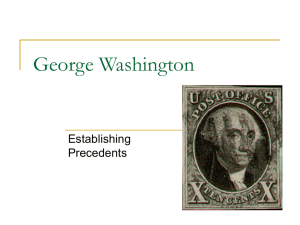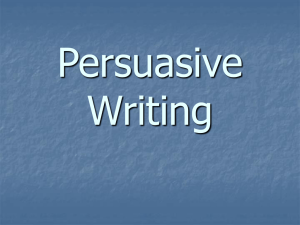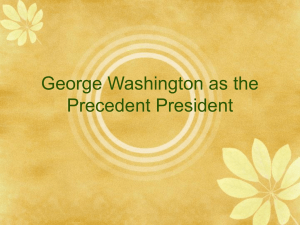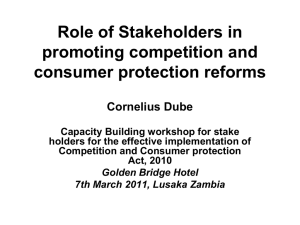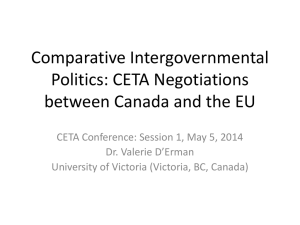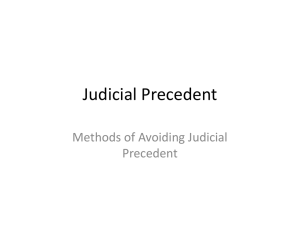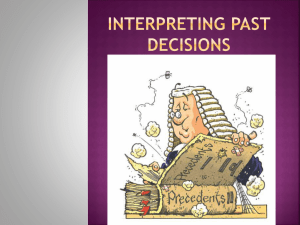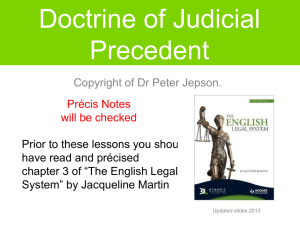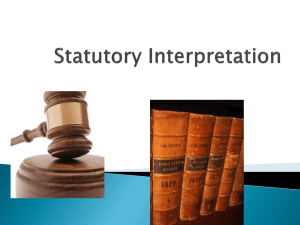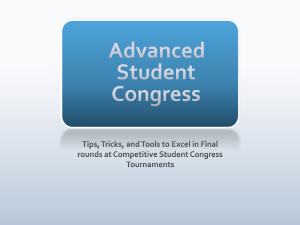paper () - London School of Economics and Political Science
advertisement
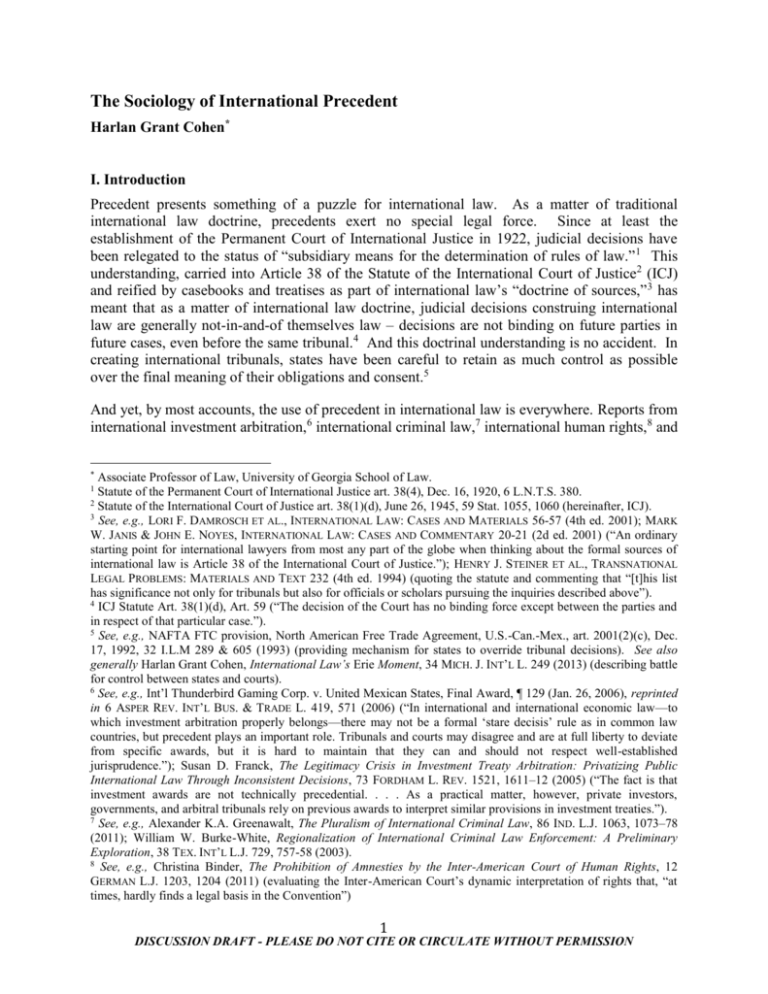
The Sociology of International Precedent Harlan Grant Cohen* I. Introduction Precedent presents something of a puzzle for international law. As a matter of traditional international law doctrine, precedents exert no special legal force. Since at least the establishment of the Permanent Court of International Justice in 1922, judicial decisions have been relegated to the status of “subsidiary means for the determination of rules of law.” 1 This understanding, carried into Article 38 of the Statute of the International Court of Justice2 (ICJ) and reified by casebooks and treatises as part of international law’s “doctrine of sources,” 3 has meant that as a matter of international law doctrine, judicial decisions construing international law are generally not-in-and-of themselves law – decisions are not binding on future parties in future cases, even before the same tribunal.4 And this doctrinal understanding is no accident. In creating international tribunals, states have been careful to retain as much control as possible over the final meaning of their obligations and consent.5 And yet, by most accounts, the use of precedent in international law is everywhere. Reports from international investment arbitration,6 international criminal law,7 international human rights,8 and * Associate Professor of Law, University of Georgia School of Law. Statute of the Permanent Court of International Justice art. 38(4), Dec. 16, 1920, 6 L.N.T.S. 380. 2 Statute of the International Court of Justice art. 38(1)(d), June 26, 1945, 59 Stat. 1055, 1060 (hereinafter, ICJ). 3 See, e.g., LORI F. DAMROSCH ET AL., INTERNATIONAL LAW: CASES AND MATERIALS 56-57 (4th ed. 2001); MARK W. JANIS & JOHN E. NOYES, INTERNATIONAL LAW: CASES AND COMMENTARY 20-21 (2d ed. 2001) (“An ordinary starting point for international lawyers from most any part of the globe when thinking about the formal sources of international law is Article 38 of the International Court of Justice.”); HENRY J. STEINER ET AL., TRANSNATIONAL LEGAL PROBLEMS: MATERIALS AND TEXT 232 (4th ed. 1994) (quoting the statute and commenting that “[t]his list has significance not only for tribunals but also for officials or scholars pursuing the inquiries described above”). 4 ICJ Statute Art. 38(1)(d), Art. 59 (“The decision of the Court has no binding force except between the parties and in respect of that particular case.”). 5 See, e.g., NAFTA FTC provision, North American Free Trade Agreement, U.S.-Can.-Mex., art. 2001(2)(c), Dec. 17, 1992, 32 I.L.M 289 & 605 (1993) (providing mechanism for states to override tribunal decisions). See also generally Harlan Grant Cohen, International Law’s Erie Moment, 34 MICH. J. INT’L L. 249 (2013) (describing battle for control between states and courts). 6 See, e.g., Int’l Thunderbird Gaming Corp. v. United Mexican States, Final Award, ¶ 129 (Jan. 26, 2006), reprinted in 6 ASPER REV. INT’L BUS. & TRADE L. 419, 571 (2006) (“In international and international economic law—to which investment arbitration properly belongs—there may not be a formal ‘stare decisis’ rule as in common law countries, but precedent plays an important role. Tribunals and courts may disagree and are at full liberty to deviate from specific awards, but it is hard to maintain that they can and should not respect well-established jurisprudence.”); Susan D. Franck, The Legitimacy Crisis in Investment Treaty Arbitration: Privatizing Public International Law Through Inconsistent Decisions, 73 FORDHAM L. REV. 1521, 1611–12 (2005) (“The fact is that investment awards are not technically precedential. . . . As a practical matter, however, private investors, governments, and arbitral tribunals rely on previous awards to interpret similar provisions in investment treaties.”). 7 See, e.g., Alexander K.A. Greenawalt, The Pluralism of International Criminal Law, 86 IND. L.J. 1063, 1073–78 (2011); William W. Burke-White, Regionalization of International Criminal Law Enforcement: A Preliminary Exploration, 38 TEX. INT’L L.J. 729, 757-58 (2003). 8 See, e.g., Christina Binder, The Prohibition of Amnesties by the Inter-American Court of Human Rights, 12 GERMAN L.J. 1203, 1204 (2011) (evaluating the Inter-American Court’s dynamic interpretation of rights that, “at times, hardly finds a legal basis in the Convention”) 1 1 DISCUSSION DRAFT - PLEASE DO NOT CITE OR CIRCULATE WITHOUT PERMISSION Sociological Inquiries Into International Law international trade,9 all testify to precedent’s apparent authority. Across international law, practitioners invoke it and tribunals apply it. This would be remarkable if courts and tribunals simply cited their own precedent – international law doctrine requires no such result. But courts and tribunals go much farther (following the lead of international advocates), citing positively or negatively even the decisions of other unrelated courts and tribunals emanating from different areas of international law, with different mandates. The precedents from one regional body are argued to others;10 precedents from human rights courts are argued to investment tribunals;11 precedents from ad hoc criminal tribunals are applied to domestic civil judgments.12 Nor is this phenomenon limited to arguments from, to, or in the shadow of international tribunals. The invocation of tribunal decisions as precedent has become part of the fabric of international legal discourse, structuring everyday arguments between international actors over the meaning of international law rules even far outside the shadow of any court. Russian and Crimean political leaders invoke the ICJ’s Advisory Opinion on Kosovo’s declaration of independence as precedent for the legality of Crimea’s secession and absorption into Russia.13 Advocacy groups like Human Rights Watch invoke decisions of the International Criminal Tribunal for Yugoslavia (ICTY) in open letters to government on the legality of tactics used to fight terrorist groups.14 Academics invoke ICJ decisions in Nicaragua v. United States, the Israeli Wall Advisory Opinion, and Democratic Republic of Congo v. Uganda in debates over the legality of the use of force against non-state actors.15 And perhaps most surprisingly, the Department of Justice responds to decisions of the ICTY, European Court of Human Rights, and the U.N. Committee Against Torture in internal, confidential government memoranda.16 9 See, e.g., Zhu Lanye, The Effects of the WTO Dispute Settlement Panel and Appellate Body Reports: Is the Dispute Settlement Body Resolving Disputes Only or Making Precedent at the Same Time?, 17 TEMP. INT’L & COMP. L.J. 221, 230 (2003) (“If we regard precedents as decisions furnishing a basis for determining later cases involving similar facts or issues we can say without hesitation that large amounts of such precedents exist in the WTO dispute settlement system.”); Raj Bhala, The Myth about Stare Decisis and International Trade Law (Part One of a Trilogy), 14 AM. U. INT’L L. REV. 845, 850 (1999) (“In brief, there is a body of international common law of trade emerging as a result of adjudication by the WTO’s Appellate Body.”). 10 See, e.g., Laurence R. Helfer, Overlegalizing Human Rights: International Relations Theory and the Commonwealth Caribbean Backlash Against Human Rights Regimes, 102 COLUM. L. REV. 1832 (2002) (describing the migration of the ECHR Soering precedent to other bodies). 11 See generally Andrea K. Bjorklund and Sophie Nappert, Beyond Fragmentation in NEW DIRECTIONS IN INTERNATIONAL ECONOMIC LAW - IN MEMORIAM THOMAS WÄLDE 439 (2011) (discussing cases). 12 U.S. courts have, for example, turned to the jurisprudence of the ICTY and ICTR to ascertain the standard for aiding and abetting liability under the Alien Tort Statute, 28 U.S.C. §1350. Compare Sarei v. Rio Tinto, PLC, 671 F. 3d 736 (9th Cir. 2011) with Presbyterian Church of Sudan v. Talisman Energy, Inc., 582 F.3d 244 (2d Cir. 2009). 13 Crimea parliament declares independence from Ukraine ahead of referendum, RUSSIAN TIMES, March 13, 2014 (quoting the Crimean Parliament’s declaration invoking “the confirmation of the status of Kosovo by the United Nations International Court of Justice on July, 22, 2010, which says that unilateral declaration of independence by a part of the country doesn’t violate any international norms”). See also Christian Marxsen, Crimea’s Declaration of Independence, EJILTalk!, March 18, 2014, http://www.ejiltalk.org/crimeas-declaration-of-independence/. 14 See Human Rights Watch, Letter to Defense Secretary Chuck Hagel on Reassessing the Al Qaeda War Model, July 29th, 2013, available at http://www.hrw.org/news/2013/07/29/letter-defense-secretary-chuck-hagel-reassessingal-qaeda-war-model (looking to the ICTY’s Tadic decision as precedent for the definition and boundaries of a noninternational armed conflict). 15 See, e.g., Kevin Jon Heller, The “Unwilling or Unable” Standard for Self-Defense, OpinioJuris, September 17th, 2011, http://opiniojuris.org/2011/09/17/the-unwilling-or-unable-standard-for-self-defense-against-non-state-actors/. 16 Department of Justice White Paper, “Lawfulness of a Lethal Operation Against a U.S. Citizen Who Is a Senior Operational Leader of Al-Qa’ida or An Associated Force,” at 4, available at 2 DISCUSSION DRAFT - PLEASE DO NOT CITE OR CIRCULATE WITHOUT PERMISSION The Sociology of International Precedent Together with other interpretations of international law by expert committees, by international organizations, or by states, these decisions vie for status as authoritative statements of what international law requires.17 But if this puzzling phenomenon is ubiquitous and even widely recognized, it has nonetheless, remained largely unexplained. Why, in the absence of any doctrinal requirement (or perhaps, permission), do some interpretations of international law by some courts, tribunals, or other bodies take on the force of precedent? Why do some interpretations come to be seen as authoritative, allowing some actors to wield them and forcing others to respond? For the most part, existing discussions of international precedent fail to deal squarely with these questions. This project seeks to answer these questions and to explain when and why certain interpretations of international law come to structure discussions and debates regarding international law’s content and meaning. It does so by trying to develop a sociological account of international precedent that can complement and illuminate existing positivist and rationalist accounts. As will be explained below, what’s lost in the prevailing positivist and rationalist accounts is precedent’s role in legal argumentation and the actors and audiences who take part in it – in other words, precedent’s role in the practice of international law. Looking more closely at the “communities of practice”18 in various areas of international law and the varied actors who take part in them, this project hopes to construct the “field”19 (or really, fields) of international law and the role that precedents play within it. II. Finding the Right Frame A. The Limits of Positivist and Rationalist Accounts Many observers have noted the emergence of precedent within particular fields; some have even opined as to whether that trend is good or bad.20 But few have gone further to ask why a system or habit of precedent has emerged in the first place, let alone to try to explain the varied shapes msnbcmedia.msn.com/i/msnbc/sections/.../020413_DOJ_White_Paper.pdf. (quoting Prosecutor v. Tadic, Case No. IT-94-1AR72, Decision on the Motion for Interlocutory Appeal on Jurisdiction, ¶ 70 (Int’l Crim. Trib. For the Former Yugoslavia, App. Chamber Oct. 2, 1995)); Office of Legal Counsel, Department of Justice, Memorandum for John A. Rizzo Senior Deputy General Counsel, Central Intelligence Agency, May 10, 2005, at 30 n.37 (citing Irelandv. United Kingdom, 25 Eur. Ct. RR (ser. A) (1978)); id. at 40 n.50 (citing Irelandv. United Kingdom, 25 Eur. Ct. RR (ser. A) (1978) and Concluding Observations of the Committee Against Torture: Israel, U.N. Doc. A/52/44 at ¶ 257 (May 9, 2007). 17 For a fuller account of the potential sources of international precedent, see Harlan Grant Cohen, Theorizing International Precedent in INTERPRETATION IN INTERNATIONAL LAW (Bianchi, Peat, and Windsor, eds., forthcoming 2014) 18 For a fuller discussion of how communities of practice are structured, see Harlan Grant Cohen, Finding International Law, Part II: Our Fragmenting Legal Community, 44 N.Y.U. J. INT’L L. & POL. 1049, 1065-69, 108990 (2012) (building off the work of Emanuel Adler and in particular, EMANUEL ADLER, COMMUNITARIAN INTERNATIONAL RELATIONS: THE EPISTEMIC FOUNDATIONS OF INTERNATIONAL RELATIONS (2005)). 19 See generally Pierre Bourdieu, The Force of Law: Toward a Sociology of the Juridical Field, 38 HASTINGS L. J. 805 (1987). See also generally YVES DEZALAY & BRYANT G. GARTH, DEALING IN VIRTUE: INTERNATIONAL COMMERCIAL ARBITRATION AND THE CONSTRUCTION OF A TRANSNATIONAL LEGAL ORDER (1998) (applying Bourdieu’s insights and describing the “field” of international commercial arbitration). 20 See, e.g., Meredith Crowley and Robert Howse, US–Stainless Steel (Mexico), 9 WORLD TRADE REV. 117 (2010) (considering stare decisis a valuable development at the WTO); Irene M. Ten-Cate, The Costs of Consistency: Precedent in Investment Treaty Arbitration, 51 COLUM. J. TRANSNAT’L L. 418, 421 (2013) (arguing against precedent in investment arbitration). 3 DISCUSSION DRAFT - PLEASE DO NOT CITE OR CIRCULATE WITHOUT PERMISSION Sociological Inquiries Into International Law those systems or habits might take. Most of the existing accounts of international precedent instead approach the question obliquely focusing on different questions such as (1) when and why states delegate interpretive authority to tribunals,21 (2) when and why, strategically, states, courts, or other actors might invoke tribunal decisions as authoritative,22 or (3) when and why states might follow or rely on particular tribunal decisions23 (and by extension, might invoke those decisions as authoritative in the future).24 These accounts have tended to start from either a positivist or rationalist perspective and go some way towards explaining why precedent might be a desirable or undesirable regime design feature, a useful coordination point, or a useful litigation or adjudication strategy. But all seems limited in their ability to explain uses of precedent that seem to go against the self-interest of the actors involved or that are far removed from their original litigations contexts. Some of these accounts suggest that precedents can act as soft law, providing useful predictors of what others actors will believe the law requires25 or that precedent may exert independent compliance pull on actors – a reality litigants and judges may use to their benefit.26 But even in these cases, the mechanism – why precedent would be a predictor or how it would exert compliance pull is left somewhat to the imagination. The problem with these existing accounts is that focused on other questions like delegation, compliance, or strategy, they focus too much on the inputs and outputs of the legal system—on particular moments when constitutive treaties are drafted, when litigation strategies are designed, when the decision is made to comply or not. While these moments implicate precedent, they don’t deal with it head on, and such miss the ways in which precedent actually works and the function it plays in legal argumentation. B. The Potential for Sociological Accounts Understanding the emergence of international precedent requires an account not just of the inputs and outputs of the legal process, but of that process itself. Understanding international precedent requires an account of the practice of international law.27 21 Some of these accounts focus on explicit, formal delegation by states to tribunals, see, e.g., Bhala, supra note 9, 863-68; Anthea Roberts, Power and Persuasion in Investment Treaty Interpretation: The Dual Role of States, 104 AM. J. INT’L L. 179, 188 (2010) (describing orthodox position); while others on more functionalist, implicit delegations outside (or more hidden within) the four-corners of the treaty text, see, e.g. Crowley and Howse, supra note __ (describing functionalist argument for WTO and ICTY stare decisis); Karen J. Alter, Agents or Trustees? International Courts in Their Political Context, 14 EUR. J. INT'L REL. 33, 38-39 (2008). 22 See, e.g., generally, Laurence R. Helfer and Anne-Marie Slaughter, Why States Create International Tribunals: A Response to Professors Posner and Yoo. 93 CAL. L. REV. 899 (2005). 23 See, e.g., generally Eric A. Posner & John C. Yoo, Judicial Independence in International Tribunals, 93 CAL. L. REV. 1 (2005) (suggesting tribunal decisions might be used to help find mutually beneficial coordination points that can help solve battle-of-the-sexes games); Andrew T. Guzman & Timothy L. Meyer, International Common Law: The Soft Law of International Tribunals, 9 CHI. J. INT’L L. 515 (2009) (suggesting that states may use and invoke precedent as a form of soft law legislation). 24 For a fuller description of these accounts and their limitations, see Harlan Grant Cohen, supra note 17. 25 See Guzman and Meyer, supra note __. 26 See Helfer and Slaughter, supra note __. See also Krzysztof J. Pelc, Shaping Precedent in International Trade Law: A Social Network Application, October 1, 2012 (suggesting that WTO member bring disputes under the Dispute Settlement Understanding less with an eye towards the value of their claim in that case than with an eye towards the favorable precedent a victory in that case may establish). 27 Cf. JUTTA BRUNNEE´ & STEPHEN J. TOOPE, LEGITIMACY AND LEGALITY IN INTERNATIONAL LAW: AN INTERACTIONAL ACCOUNT 25–26 (2010). 4 DISCUSSION DRAFT - PLEASE DO NOT CITE OR CIRCULATE WITHOUT PERMISSION The Sociology of International Precedent Law does not simply provide rules to be followed. Law also sets the norm or rules for discerning, interpreting, advocating, and debating the contents of those rules. It provides a set of spoken and unspoken ground-rules that structure an ongoing claim and response over the applicable law. One party argues for one interpretation of the rules; another argues for a different one. The law frames which arguments are better or worse, which arguments will be convincing and which will fail. It is in this process, this practice, that precedents gain their legal force and play their role. Precedent might best be understood as the burden prior interpretations of a particular rule put on future arguments about the content or meaning of the rule.28 In its weakest form, precedent simply supplies an argument that one must respond to; one cannot make an argument about the rule’s meaning without some reference to why the prior decision is right, wrong, or distinguishable.29 In its strongest form, precedent creates a strong presumption that the prior interpretation of the rule is in fact the rule. The question is not why actors do follow or do not follow precedent, but instead when and why prior interpretations place these burdens on arguments about the rule. This means that fully understanding how and why interpretations take on weight as precedents requires understanding the process of legal argumentation and the practitioners who take part it in it. Elsewhere, I have argued that thinking about international law as the product of specific communities of practice can help explain the philosophical, theoretical, and doctrinal differences developing between different areas of international law,30 e.g., international human rights law,31 international criminal law, and international investment arbitration,32 as well as the emergence of areas of transnational law almost completely divorced from state control like global administrative law.33 But imagining international law as a product of these communities of practice can also help unlock the mystery of precedent. Precedent is hard to understand as an objective fact disconnected from any particular group of actors. A prior decision by a particular legal body is a fact, but how much weight it should be given in future debates over a particular rule is dependent on how it is perceived by the actors reading it. Precedent is what Friedrich Kratochwil 34 and John Ruggie35 have described as an “institutional fact.” Like a “hit” or a “strike” in baseball, it is only a fact within the particular rules of a particular institution or community. 36 Just as a student of baseball and a student of cricket will see two very different sets of facts in a group of people with bats and ball on a field, so too will actors biased towards the authority of courts or the bindingness of precedent perceive the value of a tribunal decision differently than actors biased 28 See Marc Jacob, Precedents: Lawmaking Through International Adjudication, 12 GERMAN L.J. 1005, 1019 (2011). 29 Id. at 1019 (suggesting that “deliberately ignoring relevant prior decisions is so arbitrary and artificial a suggestion as to verge on farce”). 30 See generally Cohen, supra note 18. 31 Id. at 1070-78. 32 Id. at 1078-84. 33 Id. at 1084-89. 34 FRIEDRICH KRATOCHWIL, RULES, NORMS AND DECISIONS 22-28 (1989). 35 John Ruggie, Epistemology, Ontology, and Regimes, in CONSTRUCTING THE WORLD POLITY 90-91 (1998) (discussing KRATOCHWIL, supra note 34). 36 See id. at 91 (quoting John Rawls, Two Concepts of Justice, 64 PHIL. REV. 3, 25 (1955). 5 DISCUSSION DRAFT - PLEASE DO NOT CITE OR CIRCULATE WITHOUT PERMISSION Sociological Inquiries Into International Law towards state consent, state prerogative, and pragmatism. Different international law regimes – international human rights law, international humanitarian law, international investment law, international environmental law, or international criminal law – may involve different mixes of actors – advocates, political leaders, diplomats, military personnel, scientists, economists, international lawyers, and domestic lawyers. Each of these different actors will bring their own professional norms and biases to the debate, and different mixes of actors will agree on different norms and operating assumptions. Understanding the relative weight different decisions by different bodies seem to carry in different contexts requires understanding the communities of actors who might perceive them that way. The key is identifying the actors who practice in a particular area of law, both at the center of that practice, interacting regularly and intensely over the meaning rules, and at the periphery. 37 Looking at these particular actors or groups of actors, we can begin to isolate characteristics, habits, biases, or incentives that might shape the international legal practice in which they engage. Elsewhere, I have sought to catalogue the various potential sources of precedent in international law – the range of tribunal decisions, national court opinions, expert interpretations, and state actions that might be invoked as authoritative interpretations of international law – and the varied potential reasons any particular interpretation might be deemed more or less authoritative, ranging from the self-interested to the principled.38 Focusing on the actors participating in international legal process helps us to see how they might interact with and understand these two factors. We might, for example, focus on these actors’ professional training, asking how training in law, economics, science, or soldiering might change or construct their views regarding particular sources. Based on their training, we might expect lawyers, particularly common-law lawyers, to be more familiar with judicial opinions and to find judicial opinions more easily accessible.39 Given rule-of-law principles that suffuse their training, we might also expect them to weigh consistency with prior interpretation and adherence to the broader legal regime more heavily, and see judicial opinions that recognize these principles as more authoritative.40 We might expect military personnel to see sources differently, looking to pragmatic concerns of military effectiveness and looking to prior combat actions as more authoritative precedents. 37 For a fuller discussion of how communities of practice are structured, see Cohen, Finding, Part II, supra note 30, at 1065-69, 1089-90 (building off the work of Emanuel Adler and in particular, EMANUEL ADLER, COMMUNITARIAN INTERNATIONAL RELATIONS: THE EPISTEMIC FOUNDATIONS OF INTERNATIONAL RELATIONS (2005)). 38 See Cohen, supra note 17. 39 See, e.g., David MacArthur, Comment & Note: NAFTA Chapter 11: On an Environmental Collision Course with the World Bank, 2003 Utah L. Rev. 913, 930 (2003) (commenting that it “it is natural that lawyers and arbitrators trained in a common-law tradition would follow old habits in reasoning their way through these disputes”). 40 See, e.g., Laurence R. Helfer and Anne-Marie Slaughter, Toward a Theory of Effective Transnational Adjudication, 107 YALE L. J. 273 (1997); see also Erik Voeten, Does a Professional Judiciary Induce More Compliance?: Evidence from the European Court of Human Rights, *4-6 (Mar. 27, 2012), available at http://papers.ssrn.com/sol3/papers.cfm?abstract_id=2029786 (finding that decisions rendered by ECHR panels made up of majority professional judges were more likely to be complied with than decisions made by panels whose majority hailed from other areas, e.g., diplomats, politicians and suggesting that this disparity might be explained by the relative importance of national judges as an audience for ECHR decisions and as compliance agents in enforcing those decisions at home). 6 DISCUSSION DRAFT - PLEASE DO NOT CITE OR CIRCULATE WITHOUT PERMISSION The Sociology of International Precedent Or we might look at look at the epistemic communities in which these actors operate, asking who they interact with on a regular basis. We might expect foreign ministry lawyers who deal regularly with diplomats to approach potential sources of precedent differently from military lawyers embedded within the military chain of command.41 We might expect international criminal law lawyers with one foot in domestic criminal law to approach issues (often the same issues) differently from military lawyers.42 And we might expect private commercial law lawyers, government lawyers, and public international lawyers to value different sources of authority in investment arbitration.43 Alternatively, we might want to look at different actors’ social and political capital or incentives. How is success in their job defined and who defines it? Even if they are all trained as lawyers, politicians,44 bureaucrats, NGO activists, judges, and military lawyers may all respond to different incentives and may look to different audiences for career or personal advancement. To the extent they work with other lawyers, particularly domestic lawyers, they may be expected to argue from judicial precedent. Failing to cite precedents that might seem relevant to other lawyers may even result in professional opprobrium or sanction. Within a legal organization, arguments that follow the professional script and reference judicial precedents will be rewarded. Arguments that seek to be overly creative or iconoclastic might not. And these effects should be compounded with in subfields of international law, where specific sources – decisions of international criminal tribunals, human rights bodies, investment arbitral tribunals, national court opinions, International Committee of the Red Cross commentaries, UN Security Council resolutions – may be seen as particularly important or authoritative. Working with non-lawyers, lawyers will face other considerations. In some cases, arguments from judicial precedent may enhance the lawyer’s stature. Lawyers as a professional group have specific sources of political and social capital that they can use to maintain their importance and relevance in relation to other societal actors,45 among which is lawyers’ purported expertise in interpreting and applying certain legal sources. This expertise includes, among other things, stylized forms of analogical reasoning and the ability to parse legal opinions. Lawyers, seeking to maximize their own power and authority vis-à-vis other international actors, may want to emphasize the value of precedents and their unique ability to understand them. In other contexts, however, lawyers may fear being seen as irrelevant by other actors and too easily marginalized. Government lawyers often recount how precedent-strewn arguments made amongst lawyers are shorn of references to international decisions when made to political leaders who might perceive their authority differently (or in some cases, negatively). See David Luban, Military Necessity and the Cultures of Military Law, 26 LEIDEN J. INT’L L. 315, 318 (2013). See Kenneth Anderson, The Rise of International Criminal Law: Intended and Unintended Consequences, 20 EUR. J. INT’L L. 331 (2009) (describing divergence between epistemic communities attached to international criminal law and military law). 43 See generally Anthea Roberts, Clash of Paradigms: Actors and Analogies Shaping the Investment Treaty System, 107 AM. J. INT’L LAW 45 (2013). 44 See generally KATERINA LINOS, THE DEMOCRATIC FOUNDATIONS OF POLICY DIFFUSION (2013) (on why politician cite foreign models regarding health care and family policy). 45 See generally Pierre Bourdieu, The Force of Law: Toward a Sociology of the Juridical Field, 38 HASTINGS L. J. 805 (1987). See also generally YVES DEZALAY & BRYANT G. GARTH, DEALING IN VIRTUE: INTERNATIONAL COMMERCIAL ARBITRATION AND THE CONSTRUCTION OF A TRANSNATIONAL LEGAL ORDER (1998) (applying Bourdieu’s insights and describing the “field” of international commercial arbitration). 41 42 7 DISCUSSION DRAFT - PLEASE DO NOT CITE OR CIRCULATE WITHOUT PERMISSION Sociological Inquiries Into International Law Finally, we might group them according to their function and relationship to precedent: Are they advocating, judging, administering, or seeking guidance for action? Depending in the role they are playing different actors may have different reasons to invoke a particular source as precedent. A court or tribunal may have very specific incentives different from those of other actors. It may want to cite high prestige courts they might seek to convince or which may be seen as authoritative by other courts whose enforcement assistance it might need. It might want to cite other courts’ precedent to hide its own creativity or shroud itself in another court’s perceived legitimacy. It might cite its own decisions to enhance its authority over a particular set of rules. Actors performing other functions may have similarly idiosyncratic reasons to cite particular precedents.46 II. Applying the Sociological Frame: The Plan of the Project Developing a sociological account of the emergence of international precedent is an enormous, unwieldy project. Currently, I am attacking it from a number of angles in the hopes that the lines of this project will eventually cross to draw a coherent, fuller picture of precedent’s use in international law. Part I has been a mapping project aimed at the development of a broader framework for studying and understanding international precedent. In another piece,47 I argue that international precedents seem to emerge from the interaction of three sets of factors: (1) the varied potential sources that might be treated as authoritative interpretations of international law, (2) the various features of a source – its relation to actor self-interest, its relative availability, its coherence and adherence with other interpretations and the broader legal regime, etc., and (3) the range of actors and audiences who might invoke or respond to a particular source. I then spin out three overlapping stories about how these three sets of factors might interact – a rationalist story, a jurisprudential story, and a sociological story – which I test against a couple of simple casestudies. The next part of the project seeks to on the one hand, develop a thicker account of the actual actors involved in various areas of international legal process, and on the other hand, develop fuller, more complex stories of how and why precedents are actually invoked. Towards the first goal, as an initial cut, I have been working on a series of interviews and surveys of lawyers working (1) at the U.S. State Department Legal Adviser’s Office, and (2) in international arbitration practices. Towards the second goal, I have been plumbing a range of documents from different U.S. agencies in different contexts in order to explore the differing patterns of precedent that emerge. Obviously, these case-studies will have to be followed by many, many other ones. A. Some Initial Results 1. When Are International Tribunals Cited by U.S. Government Lawyers? 46 Importantly, we also need to look at these various actors as both actors and audiences. What we need to understand is not just why those who reference a precedent might find it weighty, authoritative, even binding, but also why the audience that reference is aimed at might as well. In other words, we need to know why a lawyer assessing policy options or advocating a position might feel the need to cite a particular reference, as well as why her intended audience, policymakers, judges, opposing lawyers, might respond favorably to it. 47 See Cohen, supra note 17. 8 DISCUSSION DRAFT - PLEASE DO NOT CITE OR CIRCULATE WITHOUT PERMISSION The Sociology of International Precedent As an initial sample of actual citation practices, I have chosen to see what can be gleaned from publicly available U.S. Government documents. Aside from the obvious reason of familiarity, this sample was chosen because it reflects the practice of a sophisticated international legal actor, one with both the interest and capacity to carefully consider the legal sources it uses. The United States is likely to be aware of the range of consequences its citations might produce. It also, usefully for this project, presents a natural comparison of different organizations with different personnel48—Departments of State, Justice, Defense, Commerce, etc.—and different legal contexts49—internal advice, litigating positions before international and national courts, public statements, reports to international organizations. This allows us to think about how different actors and different contexts interact to produce different patterns of precedent. As a note, across these contexts, the number of citations to decisions of international bodies is small—this is not a sample that can produce quantitatively significant results. Instead, the goal is qualitative color. Sifting through these various sub-samples is ongoing. Research into some of these sub-samples (for example, litigation briefs before various international bodies) is simply too early to produce any useful information. There is also a persistent problem that the publicly available documents from different parts of the U.S. Government vary dramatically. A few sub-samples though have been explored deeply and comprehensively enough to at least think through, in particular, (1) U.S. reporting to UN treaty bodies, (2) public speeches by the U.S. State Department Legal Advisor, (3) State Department briefs in U.S federal court litigation, and (4) memorandum of the Office Legal Counsel (OLC), part of the Department of Justice. Some of the patterns are intriguing. Perhaps not surprisingly, international tribunal decisions are at times cited as precedents in State Department briefs to U.S. Federal Courts. Elsewhere,50 I discuss the citations to the ICJ Arrest Warrant decision51 as precedent regarding foreign official immunity52 and explain why it might be expected that the department tasked with representing the United States abroad, protecting U.S. official immunity, and appearing before the ICJ would cite that decision as precedent to an American common law court socialized to the authority of judicial opinions. More interesting, going back more than two decades, the decisions of international tribunals and other bodies have from time to time been cited as precedent in OLC memos. Perhaps most intriguingly, many of these citations have been for the purpose of distinguishing or narrowly construing decisions of the European Court of Human Rights, the International Criminal As David Luban writes: “Organizational cultures are interpretive communities; lawyers in them develop their own lore about what the law means and how to read it.” David Luban, Military Necessity and the Cultures of Military Law, 26 LEIDEN J. INT’L L. 315, 318 (2013). 49 See Rebecca Ingber, Interpretation Catalysts and Executive Branch Legal Decisionmaking, 38 YALE. J. INT’L L. 359 (2013). 50 See Cohen, supra note 17. 51 Case Concerning the Arrest Warrant of 11 April 2000 (Democratic Republic of Congo v. Belgium), 2002 I.C.J. 3 (Feb. 14, 2002). 52 The typical brief read simply: “Under customary international law principles accepted by the Executive Branch, a sitting head of state's immunity is based on his status as the incumbent office holder, and it extends to all of his actions, whenever performed. Arrest Warrant of 11 Apr. 2000, 2002 I.C.J. at 21-22.” Madame Habyarimana, et al., Plaintiffs-Appellants, v. Paul Kagame, Defendant-Appellee., 2012 WL 1572450 (Appellate Brief) (C.A.10 April 30, 2012), Brief for the United States as Amicus Curiae Supporting Appellee, (No. 11-6315.) In the same way that a U.S. Supreme Court decision might be used, The Arrest Warrant case is invoked as authority for the proposition. 48 9 DISCUSSION DRAFT - PLEASE DO NOT CITE OR CIRCULATE WITHOUT PERMISSION Sociological Inquiries Into International Law Tribunal for Yugoslavia, or the UN Committee Against Torture on questions regarding interrogation, detention, or targeting. This parallels the use of the ICTY’s Tadic decision in the leaked Department of Justice White Paper on Targeted Killing53 (discussed elsewhere54). These citations are hard to explain from a traditionally rationalist perspective. The United States will not be appearing before these bodies (with the exception of the CAT committee), the audience for the memos is an internal government one rather than an external international one, and the citations do not help the memo author’s case. Something more complicated seems to be going on—whether the Justice Department lawyer’s general orientation towards judicial precedents, a departmental script that requires citation of possibly relevant decisions, concern about how nonjudicial external viewers—the bar, the media, the legal academy—might evaluate legal advice that failed to grapple with those decisions, or fear of professional sanction for failing to cite and distinguish them. These citations also stand in stark contrast to other State Department materials, where such citations are rare. A search of U.S. reports to UN treaty bodies reveals no citations to international decisions, and citations to international decisions in Legal Adviser speeches are rare. From a sociological standpoint, this might seem strange: We might expect State Department lawyers to be the most aware of, most sensitive to, and most socialized to international decisions of any U.S. Government actor. This result also stands in stark contrast with informal interviews with former State Department attorney-advisers, who attest that “every discussion of the law of armed conflict starts with Nicaragua.55” A recently leaked memo by the Legal Adviser Harold Koh on the extraterritorial applicability of U.S. obligations under the International Covenant on Civil and Political Rights 56 might suggest an answer. That memo mentions a number of decisions by international bodies including the ICJ57 and UN Human Rights Committee.58 It does not though cite them as precedents— authority for the proper interpretation of the rule. Instead the memo seems to consider them within the context of traditional sources, parsing the role that these decisions might play in traditional treaty interpretation, as for example, subsequent practice.59 What this suggests is the need for more nuanced thinking about these relationships. The State Department may be the arm of the U.S. Government most aware of international precedents, but is also the arm most sensitive to how a particular citation to those sources by foreign observers Department of Justice White Paper, “Lawfulness of a Lethal Operation Against a U.S. Citizen Who Is a Senior Operational Leader of Al-Qa’ida or An Associated Force,” at 4, available at msnbcmedia.msn.com/i/msnbc/sections/.../020413_DOJ_White_Paper.pdf. 54 See Cohen, supra note 17. 55 Military and Paramilitary Activities in and Against Nicaragua (Nicar. v. U.S.), Merits Judgment, 1986 I.C.J. 14 (June 27). 56 Office of the Legal Adviser, United States Department of State, Memorandum Opinion on the Geographic Scope of the International Covenant on Civil and Political Rights, October 19, 2010, available at http://justsecurity.org/wpcontent/uploads/2014/03/state-department-iccpr-memo.pdf. 57 Id. (citing Legal Consequences of the Construction of a Wall in Occupied Palestinian Territory, Advisory Opinion, 2004 I.C.J. 136, ¶¶ 108-111 (July 9) and Case Concerning Armed Activities on Territory o/Congo (Dem. Rep. Congo v. Uganda), 2005 I.C.J. 168, 243 (Dec. 19)). 58 Id. at 33-34. 59 Id. at 32. 53 10 DISCUSSION DRAFT - PLEASE DO NOT CITE OR CIRCULATE WITHOUT PERMISSION The Sociology of International Precedent will be read. It will approach the citation to a tribunal decision far more carefully (from an international law perspective) than a Justice Department lawyer with an internal audience might. Again, these results are highly preliminary. What I hope they suggest is the value of more thorough sociological inquiries into how and when interpretations of international law are treated precedents. 11 DISCUSSION DRAFT - PLEASE DO NOT CITE OR CIRCULATE WITHOUT PERMISSION
